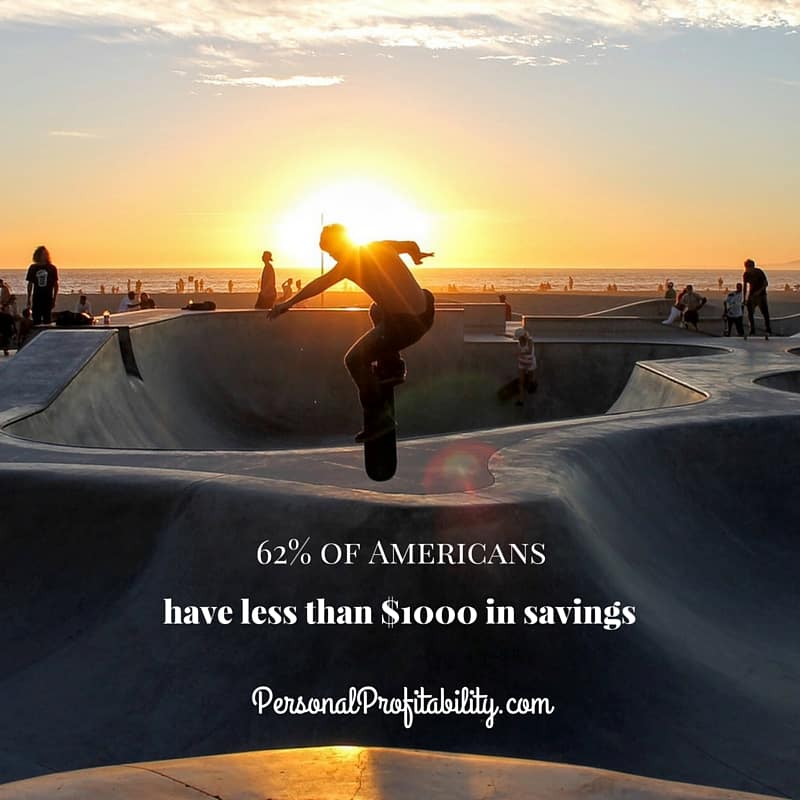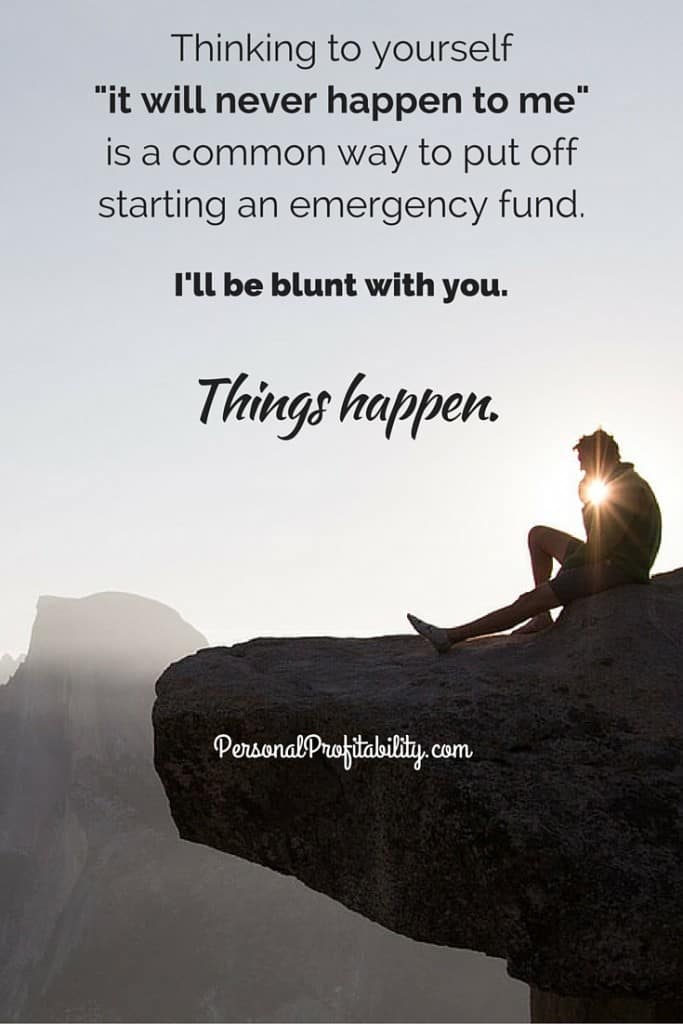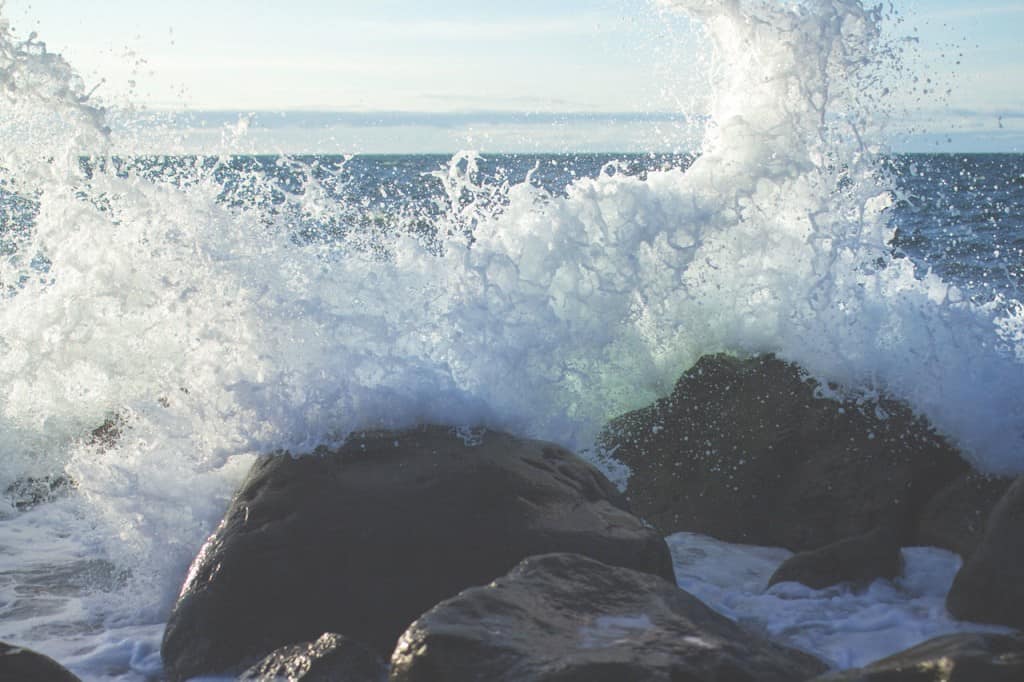In life, things come up. Your car breaks down. You need a new furnace. Things happen. Are you prepared to deal with those issues if they come up today? Many people do not have cash put aside to deal with emergency situations. It is time you do.
The Dire State of American Savings
 A recent study by GoBankingRates and Google found that 62% of Americans have less than $1000 in savings. 28% have nothing in their savings account. 21% don’t have a savings account at all!
A recent study by GoBankingRates and Google found that 62% of Americans have less than $1000 in savings. 28% have nothing in their savings account. 21% don’t have a savings account at all!
I hope most readers here do not fall into these categories. However, it is clear that if you do, you are not alone. I suggest all readers keep at least 3 months of expenses in a savings account for emergencies with a minimum of $5,000. According to the study, only 19% of people have that much or more stashed away for a bad day.
Clearly America has a savings problem. If you do not have any emergency savings, it is time to commit to fixing the problem.
Emergencies Happen
Thinking to yourself “it will never happen to me” is a common way to put off starting an emergency fund. But I’ll be blunt with you. Things happen.
I am still a fairly young guy, and I have had plenty of emergencies that required a big chunk of cash to deal with. In 2007, I was helping a friend move and my car broke down. The repair would have cost more than the car was worth, so I needed a $2,000 down payment for a new one. A few years ago, I had an unexpected plumbing issue that cost me $500. Last year I had a medical issue that cost me over $500 out-of-pocket for doctor visits, tests, and medications.
I’ve never had a $5,000 emergency, and hope I never will, but I am prepared for nearly anything with my current emergency fund. Think about your own situation. Can you answer the same question as confidently as me?
What would you do tomorrow if your house burned down? If your car completely broke down? If you had a medical issue and had to miss a month of work? If your spouse were in an accident and had to stop working completely? Are you prepared? If no, it is time to start an emergency fund.
Start an Emergency Fund with Baby Steps
I didn’t start with a $10,000 emergency fund, but that is what I have put away for emergencies today. It all started with my first $1.
Start by saving small amounts, in a checking account or cash if you don’t have a savings account yet, and add to it each payday. Start with $5 per paycheck, $10 per paycheck, or more if you can afford it. When I was building my emergency fund, I still had student loans, so I didn’t have enough free cash to put away more than about $50 per month. That was a great place for me to start. Remember, even if you have debt, you need an emergency fund.
If you find you are able to save more, do it. If you get a bonus at work or a tax refund or a cash birthday present, put it in the emergency fund. Add all cash you can until you reach your goal.
Put Your Emergency Fund in a Safe Place
 Having quick access to funds is important in case you have an unexpected emergency. Keeping that cash in a checking account would be a terrible idea. It would be a shame to earn virtually no interest. We can surely make more money than that. Here are a few options for storing your emergency fund once you have enough to open an account.
Having quick access to funds is important in case you have an unexpected emergency. Keeping that cash in a checking account would be a terrible idea. It would be a shame to earn virtually no interest. We can surely make more money than that. Here are a few options for storing your emergency fund once you have enough to open an account.
Savings Account
The easiest and most obvious choice to make more interest is through a savings account. My favorite savings account today is Capital One 360’s 360 Savings. Capital One 360 offers very competitive rates and great service.
Even if Capital One 360 is not your primary bank for checking, the savings account offering is great and you can transfer money between banks for free. It takes about 2-3 business days for most transfers. I opened a savings account with Capital One 360 in 2007 (when they were called ING Direct), and don’t hesitate suggesting it for others to give it a try. They offer fee-free banking with no minimum balance or activity requirements.
Investment Account
The next place to think about stashing your cash, if you are trying to grow it over time, is in an investment account. If you invest in a bond fund or low risk, diversified, low fee mutual fund you can invest with little risk and worry for longer term gains. I wouldn’t put your entire emergency fund into investments, but if you are saving just for the sake of saving, you can earn a lot more on your money in an index fund or low fee mutual fund than you can in the bank.
If you need to liquidate quickly, the settlement period for mutual funds is 1 day. For stocks and ETFs the settlement period is 3 days. You can’t initiate a withdrawal until your funds settle. At that point, an electronic transfer to your bank account, if it is not at the same institution as your brokerage, takes 2-3 business days.
Don’t Over Save and Under Invest
Common wisdom would say that an emergency fund can never be too big. Finance bloggers and “experts” all explain how important it is to have a fund that is big enough, but we never talk about when your fund may be too big. Once you have reached your goal, you should funnel additional savings into a better place.
Make Sure You are Covered For Typical Emergencies
A typical car repair, household emergency, or medical emergency if you are insured wouldn’t cost more than $5,000. It is possible, but unlikely. In the event you have an emergency that does cost more, you will likely have more than 24 hours to pay for it.
Take a look at your lifestyle and what types of emergencies you might run into. If you live in New York, rent an apartment, and don’t have a car, your emergency fund would not need to be as big as someone who lives in a suburban house, has a car, and has kids.
I called out $5,000 because it would cover most single people in most situations. Your circumstances may require a bigger (or smaller) fund, so think through what you might really need in a true emergency. With a mortgage and a family, a bigger number is better. That’s why I picked $10,000.
Don’t Keep too Much Cash on Hand
When I say to limit your emergency fund to $5,000, I am not suggesting you don’t have more assets available that can help you out in a jam. If you lose your job or another income source, you should have access to funds to cover your life expenses. This is beyond an emergency fund. I call it a liberty fund. Your liberty fund, or your “I am looking for a job fund,” or your “I’m moving to a new city fund,” should be much bigger than an emergency fund.
An emergency fund should only be enough to cover emergencies, and that should be kept in cash savings account.
Beyond that, invest your assets! Keep your longer term emergency funds in an investment account, not a savings account. The risks are higher, but with higher risk comes higher returns. You can invest in anything ranging from a low-risk government bond fund to a higher risk equity fund. You can even pick stocks, though for a typical investor both Warren Buffet and I advise against it.
If you use mutual funds, index funds, or ETFs, make sure to keep the fees low. I saved hundreds of dollars a year on fees after doing an analysis with the free tool Empower.
Just make sure not to put your emergency funds into CDs. You can always sell an investment and have the cash in a few days, but CDs charge interest penalties for breaking them early. With investments, you can also slowly withdraw the funds as you need them rather than taking them all at once.
Remember Your Credit Card
What happens if you don’t have 2-4 days to get to your money? I’m glad you asked!
Have enough liquid assets (can be quickly sold and turned to cash) to cover any foreseeable emergency. That can be a combination of cash, stocks, bonds, and fund investments. Never hedge paying for a true emergency, or living for a period, with credit cards. However, credit cards are the best way to pay for anything, particularly in an emergency. You don’t have to pay them off for a month, but you should always pay 100% of the balance each month to avoid interest charges.
I never spend a cent anywhere but on a credit card unless I have to, but I never spend a cent that I don’t have in the bank account behind the credit card.
Just think about it, with the right travel rewards credit card, a $5,000 emergency can get you 20% of a free plane ticket, or more. Why throw that away by writing a check or paying in cash? I have visited both Europe and Israel on miles. There is no secret on how to do it. Here is an example of what I do to get free flights.
Just only use a credit card if you are able to pay it off in full every month. Otherwise, the cost is too high.
How I Manage My Emergency Fund Savings
I have $10,000 in an online savings account earning interest and waiting for an emergency. I also keep a smaller savings account at my primary bank that I use when I’m in a cash flow pinch and don’t want to touch any other savings, such as my emergency fund, to get by for a few days or weeks. The rest of my “Liberty Fund” (my savings fund beyond the emergency fund) are invested. That way, I can quickly get to a few thousand dollars instantly without waiting a couple of days for the funds to transfer from my other bank.
I really like Capital One 360 for emergency funds, as they offer free tools for automatic, recurring, scheduled deposits from other accounts and free transfers to and from accounts at other banks any time.
The point is that you need to save. What if? That is the big question here. What if something goes wrong? You have to be ready. Today is the day to start that fund. Commit to save.
First published November 30, 2008. Updated and refreshed October 26, 2015.


Good article Eric, and something that has been on my mind as of late, so I thought I would comment. All of our situations are different, so we might have different views but this is my perspective given my situation and long term goals.
I currently have $12K in pure savings (split between COF360 & my local bank) and I am pushing to get that to $20K. Aside from that, I have about $500 in cash-on-hand and I am pushing to get that to $1,000. I am doing this a little at a time as you have outlined and once I get to the $20K/$1K mark- if I am still maximizing my tax deferred and taxable investments- I wouldn’t hesitate to go for $30K/$2K.
Right now, I am contributing $75 per paycheck to the $12K savings and -if after a nice weekend- I have an extra $20 in my pocket, I add that to my cash-on-hand account in my safe.
At these contribution rates, I figure it will take me quite a while to get to my next goal of $20K/$1K, and a really long time to get to $30K/2K. That’s ok by me as long as I keep putting the bulk of my savings in investments that earn real income.
Amazing the stats about America’s savings.
Looks like you are spot-on on the right track Mike. Awesome!
Have you considered moving a portion of that $20k/$30k goal into an investment account instead of savings? You might be able to earn quite a bit more, but of course having emergency situations covered is the first priority.
Well I have an investment account with Scottrade that I contribute to building out an income account, but I want that money liquid and accessible. From time to time I hear of some folks getting some higher interest at a small CU or something but I have never found anything where I can put that money and gain decent interest and still have it liquid. Any ideas?
I don’t know of anything where you don’t lose some liquidity. I figure if I ever need more than $10,000 at once, I can sell something and have the cash in three days when it settles.
Yeah, I hear you. I guess it just makes me feel better having cash. I have rental property that currently pays for itself, but you never know. I could find myself paying two mortgages for a while and I wouldn’t want to sell any of my investments to do that.
It definitely sucks when emergencies happen. I try to keep a liquid buffer in my savings account for small emergencies and the rest invested. I made the mistake of sitting on too much cash in my 20s. Now I try to only keep what I need for day to day expenses and a small buffer for unexpected extras in cash.
Finding the right balance between cash and investments can be tough. I always have a credit card in case of a serious emergency, and enough cash in savings to pay off anything I put on the cards before the end of the month.
Having credit for liquidity and cash on standby has been a great way for me to bridge the gap.